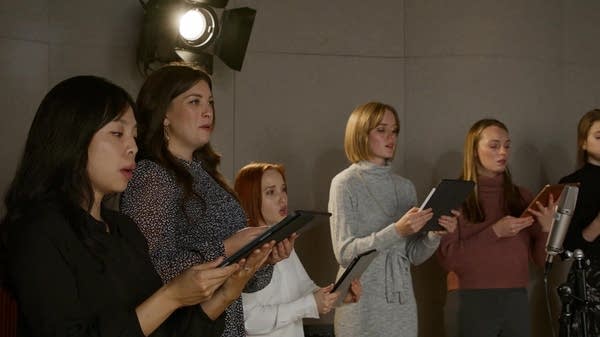Those who grow up in Christian churches sing hymns that, like magic, seamlessly integrate sacred words and lovely music by classical composers.
But the magic arrived late. The process involved was complicated and often haphazard, "sort of like the Wild West," in Peter Mercer-Taylor's words.
"Hark! The Herald Angels Sing," for instance, was not always sung to a Felix Mendelssohn composition. Instead, in the decades leading up to the Civil War, a well-intentioned but chaotic movement found arrangers across the land attempting to amalgamate hymnal texts and classical themes.
Mercer-Taylor's herculean efforts to chronicle and compile these efforts has brought the University of Minnesota music professor an NEH-Mellon Fellowship for Digital Publication. The goal: to create a website of contemporary choral and piano recordings of nearly 280 early-American hymn tunes, tied to his book Gems of Exquisite Beauty: How Hymnody Carried Classical Music to America.
Both the website (no domain name yet) and the book will emerge in October. The fellowship allows Mercer-Taylor to collect and cull performances of these obscure works.
"The purpose [of the book] is to tell the historical story," Mercer-Taylor said, "but the purpose of the website is to lay out the entire anthology, so people can sit down and thumb through it."
And listen to it. Mercer-Taylor is casting a massive net to persuade choruses to record 19th-century text/tune combinations. ("Anyone with a choir that has the slightest interest in singing some of these songs" can contact him.) They will join three already recorded by fellow University of Minnesota professor Kathy Saltzman Romey and her chamber choir, the University Chamber Singers.
"Many of these are quite stunning," she said, "beautifully crafted, easy to sing, with many interesting musical moments. I had no idea that this repertoire existed. What's fascinating is to hear them in the four-part arrangements. I'm hoping we can record a few more before next October."

The chorus contributions will augment piano performances of all of the hymns by Tim Lovelace, U of M professor of collaborative piano.
Interestingly, during the period that Mercer-Taylor is covering (1819 to 1860), these works were not just the provinces of houses of worship.
"Hymn-singing went on in many different places, not just churches," he said. "You could say that church music belonged in churches the same way that disco music belonged in discos, which also was heard in cars and other public places."
Because these tunes also were performed by musical societies and secular choirs, they served another purpose: exposing Americans to European classical music.
"In [mid-19th-century society], the way most Americans got any dose of classical music was through hymnals," he said.
Composers and arrangers across the land were "sticking tunes and texts together willy-nilly," he said. "You would find the same text tied to eight or 10 different tunes."
The arrangements generally spread by word of mouth (literally and figuratively), but beginning in 1819 some of them started to be assembled in books. That's when an obscure compilation, Arthur Clifton's An Original Collection of Psalm Tunes, came out with 21 works by major composers. Three years later, Lowell Mason's The Boston Handel and Haydn Society Collection of Church Music, sold about 50,000 copies. (The society still exists, and Mercer-Taylor will be in touch.)
"This is where a lot of Americans would have encountered hymn adaptations like this for the first time," Mercer-Taylor said. But for some reason the practice of publishing collections stopped as "denominations used the words but didn't exercise ownership over the music."

Then in 1841, Mason's Carmina Sacra sold more than 500,000 copies — or one for every 200 Americans at the time. That was followed by George Kingsley's The Templi Carmina (1853), with more than 60 tunes by major European composers, and William Bradbury's The Jubilee (1858), which reportedly garnered sales of 250,000.
Around 1855, hymnals as we know them today started to emerge, but most of the words/music pairings used today came later. That helps explain why of the 280 or so pieces that Mercer-Taylor is pulling together, "some might have the same text [set] to two or three different tunes," he said. "And many of them weren't verbatim refrains, but found the arranger taking a snippet of a composition and running, basically a variation of a theme."
Or, as Romey put it, "Composers or arrangers would collect these dramatic melodies and excerpt the melody and arrange it as a four-part harmony. I asked [Mercer-Taylor] to what intention, and he said perhaps to educate the congregation, sharing music that they might not be exposed to otherwise."
And now, thanks to Mercer-Taylor's ongoing efforts, the rest of us can be exposed to this essentially forgotten music.
More about Peter Mercer-Taylor
Peter Mercer-Taylor is a musicology professor at the University of Minnesota School of Music in the College of Liberal Arts. He is the author of The Life of Mendelssohn (Cambridge University Press, 2000) and the forthcoming Gems of Exquisite Beauty: How Hymnody Carried Classical Music to America, as well as the editor of The Cambridge Companion to Mendelssohn (2004).
His articles have appeared in a range of journals, including 19th-Century Music, Popular Music, Journal of the Society for American Music, Musical Quarterly, Music & Letters, and Journal of Musicology.
He earned his bachelor's degree from Amherst College and his masters and doctorate from the University of California, Berkeley. His scholarship has been divided between the 19th-century German classical tradition and contemporary popular music, including the work of the Bangles, Elvis Costello, Bill Staines and R.E.M.
His primary areas of expertise include Felix Mendelssohn, the history of popular American music and culture, 19th-century Romantic German music, music history 1750-1900, and American hymnology.
The grant awarded to Mercer-Taylor by the National Endowment for the Humanities and the Andrew W. Mellon Foundation is one of 188 projects to receive part of $30.9 million for investment in cultural and educational resources.
Love the music?
Show your support by making a gift to YourClassical.
Each day, we’re here for you with thoughtful streams that set the tone for your day – not to mention the stories and programs that inspire you to new discovery and help you explore the music you love.
YourClassical is available for free, because we are listener-supported public media. Take a moment to make your gift today.













